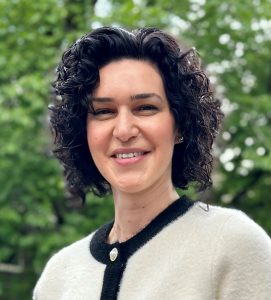Ethnic violence and religious persecution caused an exodus of millions of refugees when the Soviet Union was crumbling in the late 1980s. Among those fleeing to find a better life was the family of Marina I. Feldman, MD, MBA, joined the ABR Board of Governors earlier this month.
Dr. Feldman’s family was living in what is now Ukraine when they left for the U.S. in 1990. Residents of a small town, the family faced rampant anti-Semitism, causing Dr. Feldman to change elementary schools. Other students called her names and instigated fights, both in the classroom and on the playground, and some teachers lowered her grades.

“We are Jewish, so we were discriminated against,” she said. “The discrimination was institutionalized at the federal level with ‘Jewish’ filled into the ‘Ethnicity’ field in all of one’s documents – birth certificate, school registration and class roster, driver’s license, and internal passport for the USSR. My parents had to travel to northern Russia, close to Siberia, to pursue their post-secondary and graduate education due to strict admission quotas. We were so grateful to be granted refugee status by the U.S. and to be allowed in. We still are.”
Dr. Feldman was 12 years old when her parents reached America. She knew little English and had a hard time fitting in with her new schoolmates. The cultural differences were evident.
“It was overwhelming and disorienting,” she said. “You feel like you don’t belong. You’re an outsider. You don’t have the right clothes, the right haircut, or the right words to relate to your peers.”
Along with her other studies, Dr. Feldman took English as a second language in the seventh and eighth grades. Like fellow refugees, she was proud to pick up the language and customs of their new home.
“I believe you will find that most refugees are endlessly grateful for the chance to be safe and have the gift of an opportunity for them and their children to pursue their dreams,” she said.
Dr. Feldman, the imaging founder and co-director of the Elliot Breast Health Center in Manchester, New Hampshire, comes from a family of female physicians. Her mother, aunt, and grandmother were all doctors.
The influence of those female role models was clear when Dr. Feldman pursued BA degrees in biology and economics at Brandeis University and combined MD/MBA degrees at Tufts University School of Medicine. She went on to complete her residency in diagnostic radiology at Maimonides Medical Center and breast imaging fellowship at Northwestern Memorial Hospital.
As a medical student, she had a chance to work with one of her mother’s friends who was a breast imager.
“I shadowed her a few times. I felt that radiology in general and specifically breast radiology gave me the best of all possible worlds in medicine,” she said. “It is a field where visual discernment of detail provides clinical guidance and can offer reassurance … like knowing a secret code to solve a puzzle. That, with an added benefit to leverage one’s manual dexterity, do the biopsy and follow the patient through to their diagnosis sealed the deal. The opportunity for patient contact and patient counseling while doing procedures and working with my hands was the perfect fit.”
Dr. Feldman believes her background as an immigrant enables her to relate better to the patients she and her team treat. She works at a community hospital that helps the underserved population in New Hampshire.
“I think my own experience allows me to approach the patient with a lot more empathy and lead with a more basic human understanding of where people might be coming from and what kind of hardships they may be facing in seeking healthcare,” she said.


